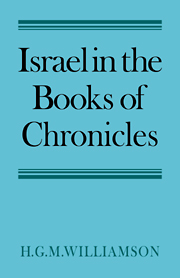Book contents
- Frontmatter
- Contents
- Foreword
- List of Abbreviations
- 1 Introduction
- PART ONE The Extent of the Chronicler's Work
- 2 2 Chronicles 36: 22f. and Ezra 1: 1–3a
- 3 The Evidence of the Greek Versions
- 4 Vocabulary and Style in Chronicles, Ezra and Nehemiah
- 5 Ideology
- 6 The Start of the Chronicler's Work
- PART TWO The Concept of Israel in the Books of Chronicles
- Bibliography
- Index of Passages Cited
- Index of Modern Authors
- General Index
2 - 2 Chronicles 36: 22f. and Ezra 1: 1–3a
Published online by Cambridge University Press: 26 February 2010
- Frontmatter
- Contents
- Foreword
- List of Abbreviations
- 1 Introduction
- PART ONE The Extent of the Chronicler's Work
- 2 2 Chronicles 36: 22f. and Ezra 1: 1–3a
- 3 The Evidence of the Greek Versions
- 4 Vocabulary and Style in Chronicles, Ezra and Nehemiah
- 5 Ideology
- 6 The Start of the Chronicler's Work
- PART TWO The Concept of Israel in the Books of Chronicles
- Bibliography
- Index of Passages Cited
- Index of Modern Authors
- General Index
Summary
L. Zunz, and most scholars since, have argued first for the common authorship of Chr. and Ezr.-Neh. from the observation that the ending of Chr. and the beginning of Ezr. are verbally almost identical. It is held that when the books were separated, an overlap was left to make clear the original connection. Representative of the explanations as to why this separation should have taken place at all is that of CM:
The separation in the Canon is apparently due to the fact that the contents of Ezra-Nehemiah were regarded as the more important, since its narrative was a proper continuation of the sacred history already canonised in i and 2 S. and 1 and 2 K., and its narrative chronologically concluded the history of Israel; while Chronicles was only supplementary to 1 and 2 S. and 1 and 2 K., and therefore was not at first very highly valued and was only at a later period received into the Canon.
In a few introductions, almost the whole case for identity of authorship is seemingly made to hang on this point, whilst many scholars list it as being first in significance. However, the evidence in itself, and the explanations of the present text, are ambiguous.
INTERNAL CONSIDERATIONS
Identity of authorship is not the only logical conclusion to draw from the fact of the overlap, and indeed, some have taken it to imply precisely the reverse. Welch, for instance, has maintained that ‘men do not take the trouble to stitch together two documents, unless they have been originally separate’.
- Type
- Chapter
- Information
- Israel in the Books of Chronicles , pp. 7 - 11Publisher: Cambridge University PressPrint publication year: 1977



